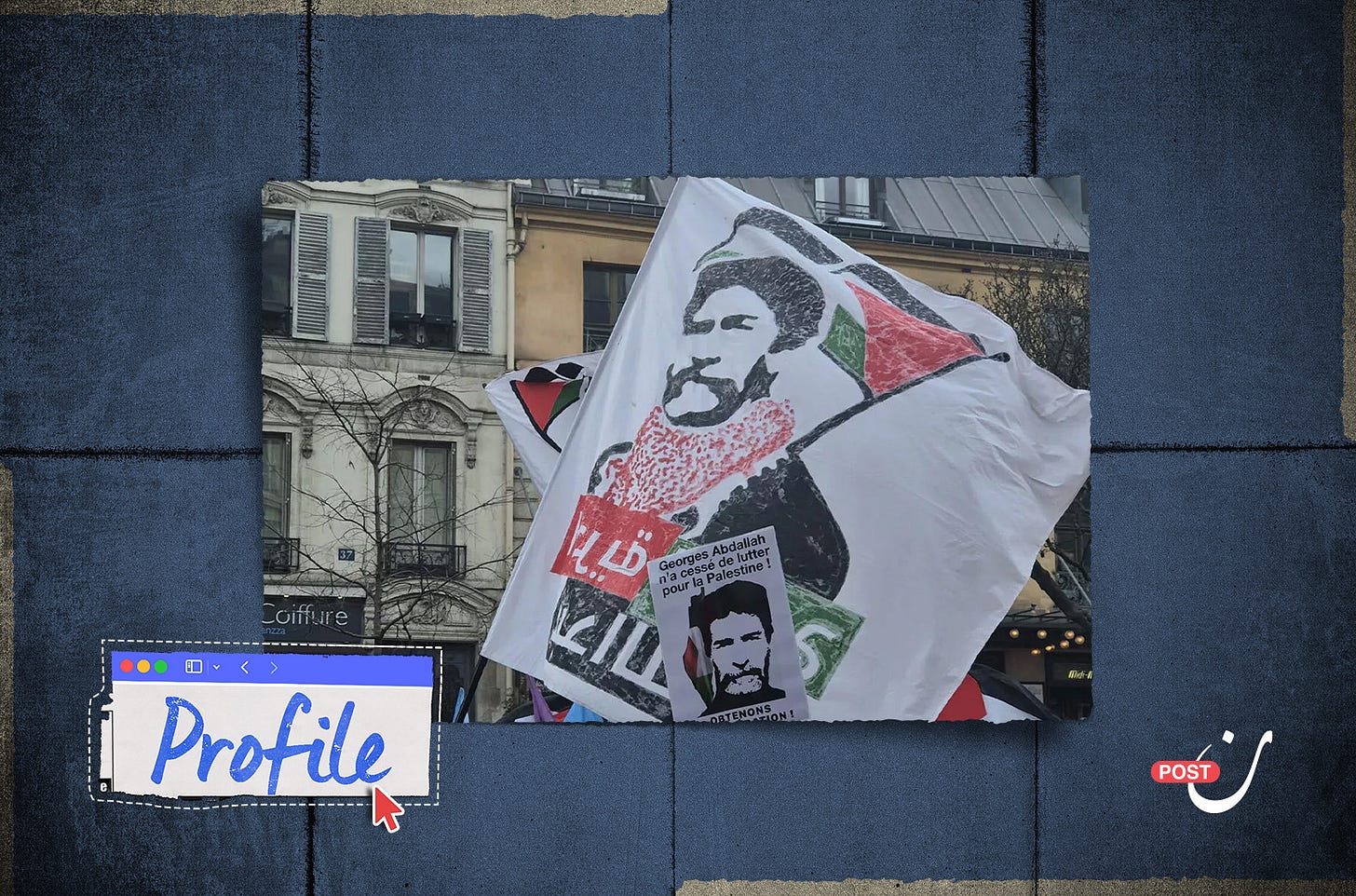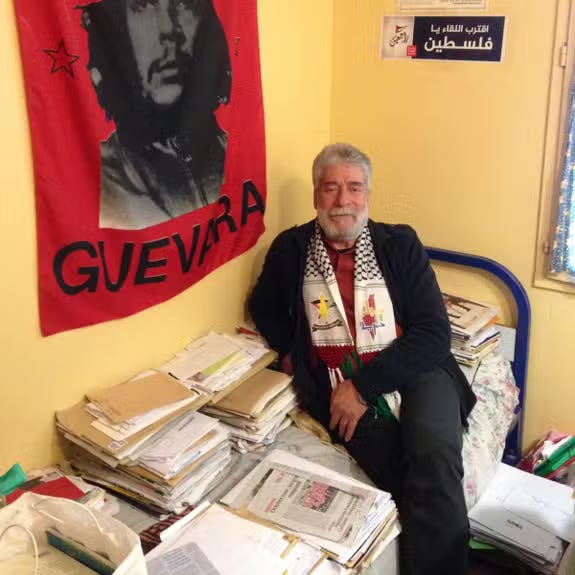On July 17, French courts ordered the release of Lebanese activist George Ibrahim Abdallah, 74, who has been imprisoned in France since 1984 for his alleged involvement in the assassinations of American and Israeli diplomats.
Celebrations erupted in Paris’s Place de la République following the announcement. Tens of thousands gathered, joined by political and human rights groups, as well as French and international media, marking a significant moment after decades of pressure campaigns demanding Abdallah’s release.
But who is George Abdallah—the man the French authorities refused to free for over 40 years? What ideologies and movements did he embrace or help establish? And how did his imprisonment become a symbolic and legal battle against imperialism and Western dominance?
Roots and Radicalization
George Ibrahim Abdallah was born on April 2, 1951, in the heart of Qoubaiyat, a Maronite Christian town in northern Lebanon. After graduating, he worked as a high school teacher but soon chose to abandon the confines of the classroom for a broader struggle—one that transcended sect and village and aligned with the heartbeat of Arab nationalism and the fight to liberate Palestine.
Lebanon in the 1970s was a nation torn apart by a civil war riddled with sectarian and class dimensions. Beneath it all lay a crisis of national identity, encapsulated by the question: "Who does Lebanon belong to?" This turbulent context gave birth to movements and ideologies striving for larger causes.
Amid this upheaval, Abdallah’s political consciousness matured. In 1978, as Israeli tanks stormed through southern Lebanon—leaving behind decimated villages, bloody massacres, and thousands of displaced people—Abdallah was wounded.
The trauma of the invasion and its aftermath marked a turning point in his life, awakening within him a deep awareness of what he saw as Western complicity. That realization propelled him into the path of armed resistance.
In that same year, he shifted allegiance from the Syrian Social Nationalist Party to the Popular Front for the Liberation of Palestine (PFLP), transitioning ideologically from pan-Arab nationalism to Marxist-Leninism—a move that reflected strategic, not incidental, commitment to revolutionary ideals.
His transformation—from a Christian Maronite teacher to a militant revolutionary—illustrates his ideological fluidity. In 1979, Abdallah founded the Lebanese Armed Revolutionary Factions (FARL), a group that included other Maronites trained by the PFLP, underlining his rejection of the narrow sectarian lens through which the Lebanese Civil War is often viewed.
Instead, Abdallah embodied a broader struggle, joining others across ideological lines in fighting Western imperialism and colonial violence, especially in Palestine.
The Armed Struggle
In 1979, George Abdallah and a small circle of friends and relatives established FARL, a group rooted in Marxist-Leninist ideology and committed to anti-imperialism and absolute solidarity with the Palestinian cause.
Their goals extended beyond slogans: they envisioned a Lebanon free of foreign domination—be it French, American, or Israeli—and the establishment of an independent Palestinian state.
FARL’s operations were few but targeted. Between 1981 and 1982, the group carried out five attacks—four of them in France. The most well-known were the assassinations of U.S. military attaché Col. Charles R. Ray and Israeli diplomat Yaakov Bar-Simantov.
The group also claimed responsibility for the 1984 attempted assassination of American Consul Robert O. Homme in Strasbourg. FARL justified these attacks as acts of “armed resistance” in retaliation for the U.S.-backed Israeli invasion of Lebanon.
FARL wasn’t an isolated entity. It built strong ties with other far-left European groups like France’s Action Directe, Italy’s Red Brigades, and Germany’s Red Army Faction. These links were not coincidental—they represented a global movement of revolutionary resistance against imperialism, with shared ideological tenets and common enemies: Western capitalism and Zionist imperialism.
The Trial
In October 1984, French police arrested George Abdallah in Lyon, initiating a trial process that continues to provoke debate about the nature of French justice.
Initially, he was charged with passport forgery (Algerian and Maltese documents), illegal weapons possession, and involvement in criminal conspiracies. In 1986, he received a four-year sentence.
But the ordeal intensified. After what authorities claimed were “newly discovered” pieces of evidence, he was tried again in 1987 for complicity in the 1982 assassinations of Ray and Bar-Simantov. He was sentenced to life imprisonment, effectively a 15-year minimum term.
The second trial was plagued by controversy: there were allegations of fabricated evidence and a stunning revelation from Abdallah’s former lawyer, Jean-Paul Mazurier, who admitted to being a French intelligence informant under the codename “Simon” between 1984 and 1986. This confession, broadcast on national TV in 1987, seriously undermined the integrity of the judicial process.
Though Abdallah became eligible for parole in 1999, all requests were denied. In 2003, a French court granted him conditional release, but the prosecution appealed—reportedly under intense political pressure. U.S. and Israeli authorities strongly opposed his release and lobbied the French government.
This pressure was palpable in repeated appeals by French justice ministers and in then-Interior Minister Manuel Valls’s 2013 refusal to sign Abdallah’s deportation order, despite court approval. WikiLeaks later revealed that Hillary Clinton had personally urged the French Foreign Minister to block his release.
A Battle Over Narrative
After decades in prison, Abdallah emerged as a symbol of global resistance. His case came to represent the broader struggle against Western and Zionist domination. Many dubbed him “the Arab Nelson Mandela,” emphasizing his status as a political prisoner and freedom fighter.
His story reflects a deep ideological war over who controls the narrative. While Abdallah was jailed for over 40 years for engaging in armed struggle against imperialism and colonialism, European militants from groups like Action Directe and the Red Brigades were released long ago.
Abdallah’s unwavering refusal to “repent” or renounce his beliefs played a key role in the West’s determination to keep him imprisoned.
The dominant Western narrative labeled Abdallah and others like him as “terrorists,” citing their use of violence against the French state. Authorities insisted that his release posed a threat to public order and security.
His freedom was thus conditional upon immediate deportation to Lebanon, in hopes of preventing him from galvanizing political support in France—especially amid current global outrage over the war in Gaza.
Over the years, Abdallah became a symbol for a new generation. Despite immense state repression, activists across France, Lebanon, Palestine, and beyond held annual rallies outside Lannemezan Prison and invoked his name in pro-Palestine protests. Murals, petitions, and banners in universities and labor unions added to the mounting pressure on French courts.
The Return of a Revolutionary
“To the heroes of resistance, a thousand salutations. You are the true guardians of national sovereignty against Zionists, their masters, and all who collude with them. Now, more than ever, we need greater Palestinian-Lebanese unity.”
This was Abdallah’s message from prison after October 7 and the eruption of war in Gaza and Lebanon.
On July 25, he is set to arrive in Lebanon, deported from France. His return marks the homecoming of a man who never strayed from his path. Large crowds—especially young people from across Lebanon’s political spectrum—are expected to greet him as a hero. Celebrations will likely continue for days.
Yet his return is also tinged with melancholy. Lebanon is no longer what it was when Abdallah left. The days of Café Faisal, of revolutionary meetings with figures like George Habash and Wadie Haddad, are long gone.
The Syrian Social Nationalist Party barely functions as a political force. The Popular Front for the Liberation of Palestine survives mostly in murals and the occasional image of Ghassan Kanafani in neglected refugee camps like Shatila.
Today’s Lebanon is far removed from the intellectual, organizational, and journalistic hub it once was. The country has become a consumerist playground—not only of goods, but also of ideas.
Political discourse is reduced to sectarian mobilization and the entrenchment of historical grievances. Since the Taif Agreement, warlords and capital have been locked in a cold war over power and influence.
The Left, too, has collapsed. It now exists only as the occasional lecture by historian Fawwaz Traboulsi, a melancholic oud melody in a dimly lit bar, or a ticketed “cultural” panel discussion.
Still, Abdallah won’t be surprised. From his prison cell, he has followed developments in the Arab world—regime changes, revolutions, wars, the rise and fall of comrades. One thing, however, has not changed: Israeli bombardment.
The same violence that led to his imprisonment over four decades ago is still unfolding, and it reminds him—perhaps even reassures him—that he served those long years for a cause that remains tragically unresolved.





